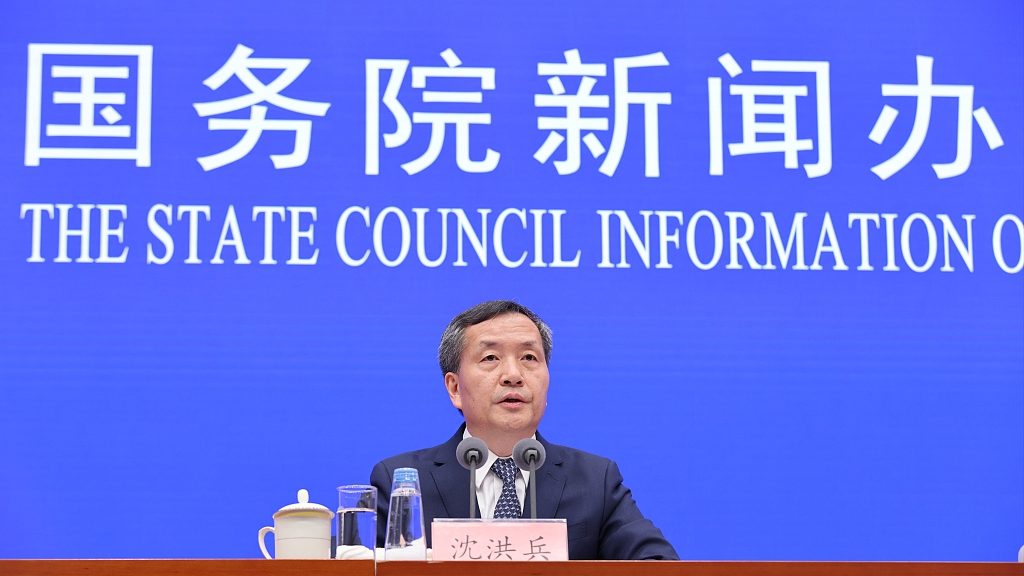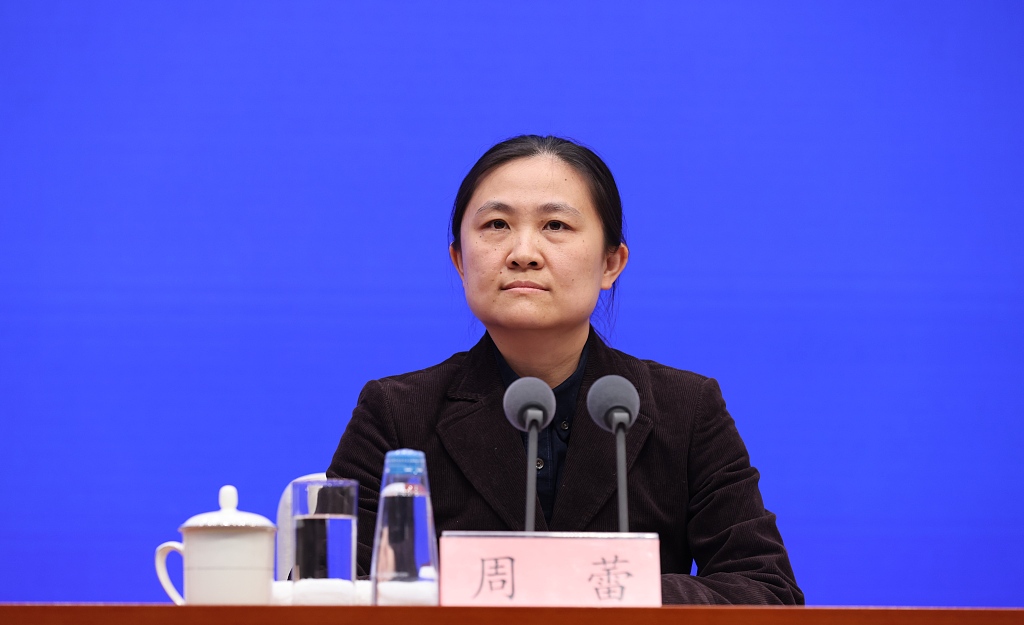China CDC: New research supports China-WHO COVID-19 origins-tracing findings
CGTN
April 10,2023

Shen Hongbing, director of the Chinese Center for Disease Control and Prevention, speaks at the a press conference in Beijing, China, April 8, 2023. /CFP
New research has further confirmed the results of the first phase of China-World Health Organization (WHO) joint studies on COVID-19 origins-tracing, Shen Hongbing, director of the Chinese Center for Disease Control and Prevention (China CDC), said at a press conference on Saturday.
"Since the outbreak of COVID-19, we have been actively communicating and cooperating with the WHO and invited the WHO to send international experts twice to conduct joint studies on SARS-CoV-2 origins-tracing in China," Shen said.
Read more:
WHO experts arrive in Wuhan for COVID-19 origins probe
After the end of the first phase of the joint studies, China continued to share its research results with the international scientific community, with research findings published in academic journals both at home and abroad.
The myth of deleting data
On April 5, researchers at the China CDC published the new version of the COVID-19 analysis collected at Wuhan's Huanan Seafood Market in the science journal Nature.
Prior to its official publication, the data was shared on the Global Initiative in Sharing Avian Influenza Data (GISAID) database but was allegedly deleted later, which promoted widespread speculation.
Shen clarified the facts, saying Chinese researchers and the GISAID database did not delete the data.
He said the first draft analysis was submitted to Nature in February 2022. During the process of submission and revision, the data was released by GISAID staff before the publication of the paper and without the knowledge of the research team.
Explaining the situation, the GISAID platform said the release was caused by staff malpractice. Data sharing was shut down but the data remained on the platform, according to Shen. "Neither our team nor the platform deleted the data, and the data access links for journal review were always there," he added.
Data transparency stressed
Shen said the first phase of the joint studies was successfully conducted in Wuhan, with a research report on China's part fully recognized by domestic and foreign experts and the WHO.
"Throughout the first phase of the joint studies, China provided the international experts with all materials related to the origins of the virus, and we did not hide any cases, samples, or testing and analysis results," he said.
Shen said the recent questioning of the research results by certain WHO officials and experts goes against the scientific spirit and is an insult to those scientists who participated in the study.
It politicizes the issue and is unacceptable to the scientific communities in China and the world as a whole, he added.
Read more:
Chinese experts dismiss coronavirus cases information 'cover-up'

Zhou Lei, a research fellow at the China CDC who participated in the joint studies in Wuhan, speaks at the a press conference in Beijing, China, April 8, 2023. /CFP
More studies reinforce previous results
A study published in the journal Protein & Cell in May 2022 indicated no evidence of transmission of COVID-19 before December 2019 in Wuhan.
Obtaining all 88,517 plasmas from 76,844 blood donors and evaluating the pan-immunoglobulin (pan-Ig) against SARS-CoV-2 in 43,850 samples from 32,484 blood donors in Wuhan between September 1 and December 31 in 2019, the team concluded that no SARS-CoV-2-specific antibodies existed among blood donors in Wuhan before 2020.
Another study of the viral profiles of more than 17,000 bats in China, published in the journal National Science Review, did not find the sequence of novel coronavirus or its related coronaviruses.
Zhou Lei, a research fellow at the China CDC who participated in the joint studies in Wuhan, said COVID-19 origins-tracing cannot be accomplished through the efforts of a single country, and requires concerted efforts from the global science community.
She expressed the hope that the WHO can organize global origins-tracing work and remain science-based, rigorous and just in this regard, so that the origins-tracing process can arrive at a convincing result.
(With input from Xinhua)
CGTN
April 10,2023

Shen Hongbing, director of the Chinese Center for Disease Control and Prevention, speaks at the a press conference in Beijing, China, April 8, 2023. /CFP
New research has further confirmed the results of the first phase of China-World Health Organization (WHO) joint studies on COVID-19 origins-tracing, Shen Hongbing, director of the Chinese Center for Disease Control and Prevention (China CDC), said at a press conference on Saturday.
"Since the outbreak of COVID-19, we have been actively communicating and cooperating with the WHO and invited the WHO to send international experts twice to conduct joint studies on SARS-CoV-2 origins-tracing in China," Shen said.
After the end of the first phase of the joint studies, China continued to share its research results with the international scientific community, with research findings published in academic journals both at home and abroad.
The myth of deleting data
On April 5, researchers at the China CDC published the new version of the COVID-19 analysis collected at Wuhan's Huanan Seafood Market in the science journal Nature.
Prior to its official publication, the data was shared on the Global Initiative in Sharing Avian Influenza Data (GISAID) database but was allegedly deleted later, which promoted widespread speculation.
Shen clarified the facts, saying Chinese researchers and the GISAID database did not delete the data.
He said the first draft analysis was submitted to Nature in February 2022. During the process of submission and revision, the data was released by GISAID staff before the publication of the paper and without the knowledge of the research team.
Explaining the situation, the GISAID platform said the release was caused by staff malpractice. Data sharing was shut down but the data remained on the platform, according to Shen. "Neither our team nor the platform deleted the data, and the data access links for journal review were always there," he added.
Data transparency stressed
Shen said the first phase of the joint studies was successfully conducted in Wuhan, with a research report on China's part fully recognized by domestic and foreign experts and the WHO.
"Throughout the first phase of the joint studies, China provided the international experts with all materials related to the origins of the virus, and we did not hide any cases, samples, or testing and analysis results," he said.
Shen said the recent questioning of the research results by certain WHO officials and experts goes against the scientific spirit and is an insult to those scientists who participated in the study.
It politicizes the issue and is unacceptable to the scientific communities in China and the world as a whole, he added.
Read more:
Chinese experts dismiss coronavirus cases information 'cover-up'

Zhou Lei, a research fellow at the China CDC who participated in the joint studies in Wuhan, speaks at the a press conference in Beijing, China, April 8, 2023. /CFP
More studies reinforce previous results
A study published in the journal Protein & Cell in May 2022 indicated no evidence of transmission of COVID-19 before December 2019 in Wuhan.
Obtaining all 88,517 plasmas from 76,844 blood donors and evaluating the pan-immunoglobulin (pan-Ig) against SARS-CoV-2 in 43,850 samples from 32,484 blood donors in Wuhan between September 1 and December 31 in 2019, the team concluded that no SARS-CoV-2-specific antibodies existed among blood donors in Wuhan before 2020.
Another study of the viral profiles of more than 17,000 bats in China, published in the journal National Science Review, did not find the sequence of novel coronavirus or its related coronaviruses.
Zhou Lei, a research fellow at the China CDC who participated in the joint studies in Wuhan, said COVID-19 origins-tracing cannot be accomplished through the efforts of a single country, and requires concerted efforts from the global science community.
She expressed the hope that the WHO can organize global origins-tracing work and remain science-based, rigorous and just in this regard, so that the origins-tracing process can arrive at a convincing result.
(With input from Xinhua)
Humans brought Covid to Wuhan market?
Chinese scientist's shocking claim
Covid In Wuhan:
The scientist also denied a recent study that suggested that racoon dogs
were the origin of the Covid virus.
A Chinese scientist claimed that the Covid-19 virus may have originated in humans negating the theory that the virus jumped from animals to humans at the Wuhan market. Tong Yigang of the Beijing University of Chemical Technology said that the genetic sequences of viral samples taken from the Huanan Seafood Market in Wuhan were “almost identical” to those of patients infected with Covid which thereby suggests, according to him, that Covid may have originated from humans.
Speaking at a press conference held by the Chinese State Council, Tong Yigang said that scientists took over 1,300 environmental and frozen animal samples from the Wuhan market between January 2020 and March 2020 following which they isolated three strains of the virus from the environmental samples.
The scientist also denied a recent study that suggested that racoon dogs were the origin of the Covid virus.
At the event, Chinese Center for Disease Control and Prevention (CDC) researcher Zhou Lei said that the place where Covid was first discovered- Wuhan- might not have necessarily been the place where it originated.
Scientists across the world have been long demanding data from China to understand the origins of Covid virus. Earlier, the World Health Organization (WHO) slammed China for not sharing enough data as WHO chief Tedros Adhanom Ghebreyesus said, “Without full access to the information that China has... all hypotheses are on the table.”
"That's WHO's position and that's why we have been asking China to be cooperative on this," he said. If Beijing does provide the missing data “we will know what happened or how it started”, he added.

No comments:
Post a Comment